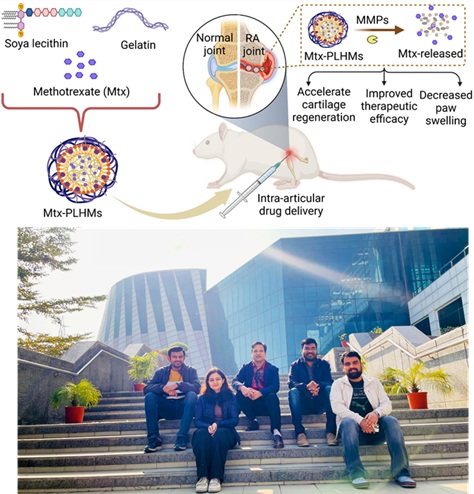Ministry of Science & Technology
Innovative drug delivery system could revolutionize treatment of Rheumatoid Arthritis (RA)
प्रविष्टि तिथि:
04 FEB 2025 4:26PM by PIB Delhi
Researchers have developed an innovative “self-actuating” drug delivery system that could revolutionize the treatment of rheumatoid arthritis (RA) by targeting inflammation directly within the joints so that therapeutic agents are released only when needed.
Rheumatoid arthritis (RA) affects millions of people worldwide, causing chronic inflammation, debilitating pain, and irreversible joint damage. Traditional treatments often rely on systemic drug administration, which not only carries the risk of significant side effects but also requires frequent dosing due to the rapid clearance of drugs from inflamed joints and is a challenge for long-lasting, localized relief.
Recognizing the need for a more efficient solution, researchers from Institute of Nano Science and Technology (INST) Mohali, an autonomous institution of the Department of Science and Technology (DST) have developed a smart system that responds directly to the biochemical signals in the inflamed synovial environment. By targeting specific inflammatory enzymes present in the joints, the system ensures that therapeutic agents are released only when needed, offering a more precise and safer treatment option for RA patients.
The system uses specially designed microspheres loaded with methotrexate, a commonly used anti-rheumatic drug. These microspheres are engineered to sense inflammation in joints and release the drug only when needed, minimizing side effects and improving therapeutic outcomes. Triggered by elevated levels of specific enzymes (MMP-2 and MMP-9) present during RA flare-ups, the formulation ensures targeted, on-demand drug delivery. In animal studies, it significantly reduced joint swelling, inflammation, and cartilage damage while promoting joint repair.
The formulation used by the team led by Dr. Rahul Kumar Verma consists of polymer-lipid hybrid micro-composites, where the lipid component (soya lecithin) ensures high drug encapsulation efficiency, and the polymer component (gelatin) provides responsiveness to Matrix metalloproteinases (MMP). The system leverages the unique biochemical signals present in the inflamed synovial microenvironment to release therapeutic agents precisely when needed. When exposed to these enzymes, the gelatin substrate is cleaved, triggering the release of the encapsulated drug in a controlled, pulsatile manner.
This breakthrough published in the journal Biomaterial Advances could offer a safer, more effective alternative to current RA treatments by eliminating the need for frequent drug injections and reducing systemic toxicity. The system enhances drug effectiveness by improving bioavailability and retention in the affected joints, leading to longer-lasting relief with fewer doses. This means less pain, improved joint function, and slower progression of joint damage for patients. With its ability to respond to fluctuations in inflammation, this treatment provides a more personalized and efficient solution, making it a promising new option for RA patients looking for better, safer care.
Beyond arthritis, the technology holds promise for managing other inflammatory diseases, such as synovitis and inflammatory bowel disease. It could also pave the way for smart biomaterials in regenerative medicine and personalized treatments. Additionally, its potential use in veterinary medicine for managing arthritis in animals highlights its versatility.

Figure: Schematic Representation of Study Design. Authors (L-R): Krishna Jadhav, Swarnima Negi, Rahul K. Verma (PI), Raghuraj Singh, and Agrim Jhilta
***
NKR/PSM
(रिलीज़ आईडी: 2099618)
आगंतुक पटल : 1475